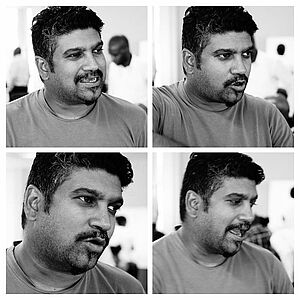Mandela's labour of love
On 24 September, the United Nations General Assembly held the Nelson Mandela Peace Summit, a high-level plenary meeting on global peace to honour the centenary of Nelson Mandela’s birth. On the occasion, we share a text by Donovan Williams, staffer at the African National Congress (ANC), on how to commemorate the legacy of Nelson Mandela. This is an edited version of an article first published in the Sunday Independent on 22 July 2018.
Since the inception of Mandela Day, I have deliberately chosen not to participate in the various public acts of charity. I viewed Mandela Day's 67 minutes [asking individuals to devote 67 minutes on the day to the service of humanity] s a media gimmick legitimizing false consciousness. It provided an opportunity for the elite to soothe their guilt without changing society.
In the recent years many people, especially young people, have referred to Madiba as a sellout, as someone who preferred the respect of his enemies more than the people. In my estimation this liberal feel-good bubble-gum moment of 67 minutes seemed to neatly reinforce the message that Madiba was not necessarily a freedom fighter, but just a nice old man who was acceptable to racist white people.
Our memory of Madiba cannot be this simple. We should never have allowed his memory to be one of hollow acts of welfare and charity for one day in a year. We have allowed Madiba’s revolutionary message of love to become one of ‘love thy neighbour’ or 'forgive and forget', allowing Madiba's memory to mean that we should not be angry. We should not press for change. We, the progressive people of South Africa have let Madiba and his memory down! We have made the memory of Madiba become like Father Christmas, a nice old man.
But, Madiba best exemplifies revolutionary morality. In 1992-93 multiparty negotiations had stalled again and South Africa was on a precipice. No-one believed that there will be a peaceful outcome. Madiba, realised before most others that the longer negotiations continued the less of a chance we had of political liberation. Hardly anyone heeded the call by the trade union for protests against VAT. The low-intensity warfare strategy of the apartheid regime and their lackeys meant that ordinary poor South Africans were dying every day in the streets of Black townships. The apartheid government's belief in substantial self-governing territories for whites grew. The (Afrikaner) ultra-right suggested that they could count on members of the defence force. If we did not have an agreement the liberation movement would lose the confidence of the people. If we walked away from the negotiations table, international support for the liberation movement would wane. Wrongly or rightly, we would have looked belligerent.
"Madiba recognised that political liberation didn’t mean South Africans were completely free, but they would be better off than under apartheid."
Madiba put aside his own ego, to place the needs of South Africans at the centre, and decided to compromise on the economy and exacting material compensation. It was a courageous act. Madiba recognised that political liberation didn't mean South Africans were completely free, but they would be better off than under apartheid. He regarded love and affection for South Africans as an act of strength not weakness.
Today South Africans behave like they hate each other, violence and hatred is so prevalent in South African society. From road rage, to femicide, gang warfare, to drunk teachers, burglaries and theft in religious places of worship, etc. South Africans are angry, and do not know who to blame, so they just hurt each other. As we shout at each other, we end up talking past one another. Everyone wants to be heard over and above the other. The hatred is palpable, you can almost touch it. We are quick to find that which divides us. We have forgotten, like Madiba taught us, that we love each other as South Africans, we care for each other and South Africa.
Madiba cherished the ideals of the rule of law. He regarded the spirit of the law, not as a voluntary suggestion, but an obligation that we all should adhere to.
Madiba always reminded us that he was not a saint, and should not be regarded as one. We have bastardised that lesson, wherein we have chastised those who expect exemplary social and personal behaviour from our leaders. We enjoy saying that we do not expect our leaders to be priests. But by accepting that all of us are sinners, we have only succeeded in removing morality as an essential element of our conduct. We expect courts of law to tell us how to behave. The legal maxim, innocent until proven guilty, has been exploited for purposes of inaction.
Madiba cherished the ideals of the rule of law. He regarded the spirit of the law, not as a voluntary suggestion, but an obligation that we all should adhere to. Corruption is a selfish perversion of the rules. It is an abuse of love and trust.
So, this Madiba Day, I decided to spend my morning handing out flowers to strangers, telling them to spread love and care. To stop the violence and remember to love ourselves as Madiba did. My fellow ordinary South Africans reciprocated the act, some hugging me, young people, especially young men, were very excited to get flowers. There was no homophobia. And every single person, young and old, woman and man, smiled at me with beautiful appreciation.
Madiba understood us South Africans better than we did, we love to love. ... it is the most revolutionary act we can do!
###
The ANC and FES share a longstanding relationship going back to the ANC's time in exile. For more on the work by FES in Africa and the history of the cooperation, contact the FES office in South Africa.
Nelson Mandela's 100th Birthday―Be the legacy
Friedrich-Ebert-Stiftung is hosting an event on 16 October 2018 in Berlin (Germany) to commemorate and honour the life of Nelson Mandela, opening space to discuss the current situation in South Africa and what Madiba's legacy means to young people today. To register, send an email to fes.afrika(at)fes.de by 8 October 2018. Visit: https://www.fes.de/fr/veranstaltung/veranstaltung/detail/226553/.
About FES Connect
Connecting people, in the spirit of social democracy, we source and share content in English from the German and international network of the Friedrich-Ebert-Stiftung.






